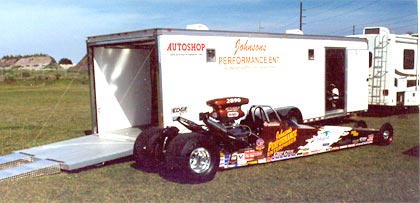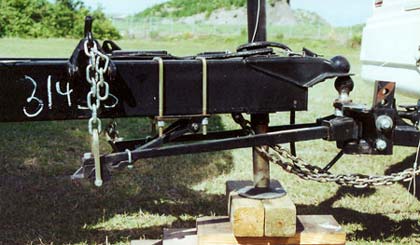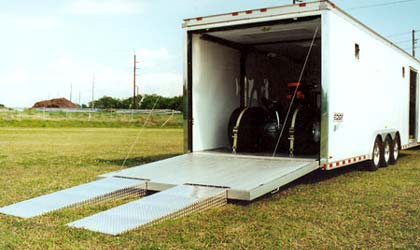 |


Because the dragster is so long and low, loading it into the trailer
was a different deal altogether. The first requirement was to remove
the fiberglass nose from the dragster and jack up the front of the trailer
as high as the trailer jack could get it. Of course, this made it more
difficult to step up into the side door of the trailer. My old trailer
also had a beaver tail floor; (the rear of the trailer drops five inches
the last four feet) which is great for most cars, but a real pain for
a dragster. To overcome this obstacle, I laid two eight-inch wide, two-inch
thick, six-foot long boards on the trailer floor so as I drove the dragster
into the trailer the front tires would ride up on these boards and the
middle of the dragster body would clear the beavertail section. After
doing this for two years, I thought there must be a better way!
Finding the better way took some luck, both good and bad. The bad luck
came first. When my wife Colleen and I were traveling through Georgia
last summer, my trailer broke a wheel bearing and this ruined an axle.
Through Dale Wilson and racing friend Peabody Harrel, I got hooked up
with Jeff Smith at Haulmark Trailers to repair the damage. This was
my good luck. While my trailer was being repaired I had time to discuss
with Jeff the problems of loading my dragster. My timing was right,
Jeff said he had some ideas to alleviate these problems and when I was
ready to order a trailer to give him a call.

At the end of the 2000 racing season I made an agreement to sell my
trailer to my friend Victor Ferra and then I gave Jeff Smith a call
and ordered a new 30-foot Haulmark Edge with the special "dragster package.'
As Jeff explained, this package incorporated some new design features
and construction techniques to lower the floor of the trailer, which
would decrease the angle of rise that the dragster has to overcome when
being loaded.
|
|